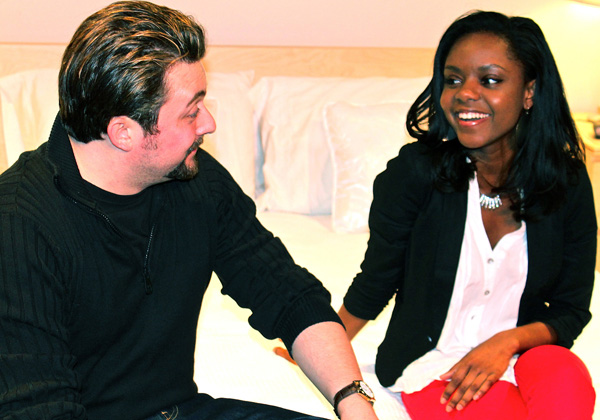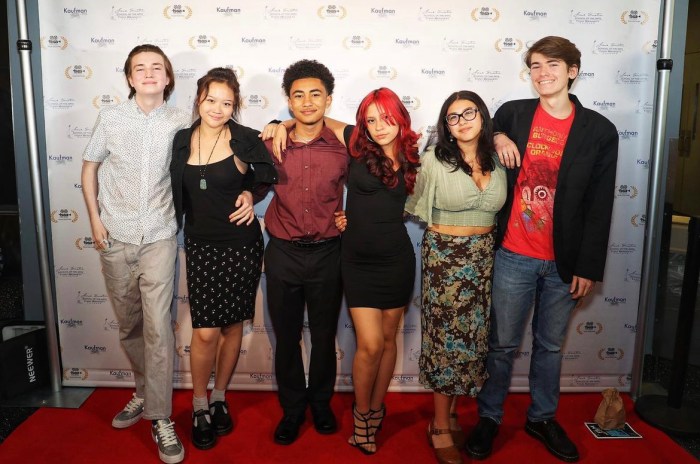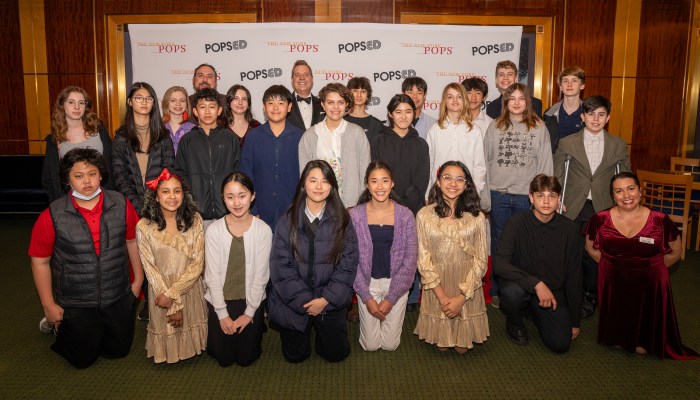By Kevin Zimmerman
Fairly or not, playwright Neil Labute’s work often is called misogynistic and for the most part that is a pretty apt label.
The fairer sex doesn’t fare too well in most of his works. From his breakthrough film, “In the Company of Men,” which focuses on two guys making a contest out of falling in love with a deaf woman only to dump her, through such plays as “Fat Pig,” in which the protagonist begins a relationship with an overweight woman only to leave her after his friends mock his choice, women are not seen so much as victims of boorish male behavior as problems for the heroes to overcome.
But in Variations Theatre Group’s new production of Labute’s “Some Girl(s),” at the Chain Theater, 21-28 45th Road in Long Island City, it’s the five female characters who attempt to figure out how to solve a problem like men.
Guy, played by Kirk Gostkowski, has a successful career as an English professor and author who is newly engaged to be married. For some reason, Guy decides it would be a good idea to visit five of his exes for what the psychology business calls “closure.”
But from the beginning it’s not clear what Guy hopes to resolve by these cross-country visits. Guy claims he just wants to make sure the five women — Sam, Tyler, Lindsay, Reggie and Bobbi — are doing OK. But as you watch Guy meet with each of them you’re not really sure if he is being honest, double-checking that he made the right decision to leave, or doing research for his next New Yorker piece.
As each of the five exes confront Guy it becomes clear he is not going to make a clean getaway this time.
Gostkowski does a good job playing the not-so-nice Guy in a way that makes him not totally unlikable. He has a nice, natural and somewhat self-deprecating style that keeps one somewhat on Guy’s side as the play progresses.
But the show really belongs to the women.
Each character represents a different time in Guy’s life, starting with Sam, his high school girlfriend he split from right before the prom; to Tyler, the artist from Chicago he dabbled with while in graduate school at Northwestern; to Lindsay, the wife of a colleague from the college he first worked at outside of Boston; to Reggie, the then pre-teen little sister of his best friend; and finally to Bobbi, the girl he made have actually loved.
As the artistic Tyler, Ashleigh Murray gets all the moves right, from her foul-mouthed talk to her clove cigarettes. Tyler isn’t interested in talking about the past, she just wants a quick hop into bed with Guy. Murray enjoys herself in the role that on the surface seems little more than a trashy bohemian, but look a little deeper and there is definitely something brewing.
Guy tells Tyler he wants to get to the bottom of the hurt that comes from a failed relationship. Then it occurs to him, maybe this meeting isn’t about Tyler but rather about the girl he left to be with her.
“You can talk yourself into anything if you say it enough,” Tyler tells him.
Talking is also not at the top of Lindsay’s to-do list. She is angry with Guy. Angry he convinced her to have an affair, angry that her husband knows about it all and angry that Guy is back in her life.
“Hurt is your byproduct,” Lindsay says.
Kathryn Neville Browne becomes one of the standouts in the cast with a measured performance that alternates between remorse and vindictiveness. You even start to feel a little sorry for Guy as Lindsay begins to seduce him through threats and intimidation.
Jacyln Sokol eases into Reggie’s anger as she shifts from remembrances to accusations. She was 11 when an 18-year-old Guy had some sort of inappropriate contact with her. He swears it was just a kiss, Reggie said it was more than that. She continues to press him, but he stands firm in his belief it was just a harmless little kiss. Realizing she is not going to get more from him, Reggie shoves Guy up against the hotel room’s wall and plants one on his mouth.
“There,” she says, “that is what a woman kisses like.”
Jill Durso also brings a little extra to her part as Bobbi, the last woman Guy reconnects with.
“I’m glad I made the cut,” Bobbi says to him after Guy confesses he only planned on visiting the “top-five finalists” of former girlfriends.
Labute does not give Bobbi a big speech or tragic backstory or frank sexuality that he imparts on her four counterparts. Bobbi’s encounter with Guy is a lot quieter with some awkward humor thrown in, but Durso still manages to say a lot with a few gestures and a couple of simple questions.
“Did you lose respect for me?” Bobbi asks at one point. “You sort of just disappeared on me.”
But then maybe Guy was never really there to begin with. It’s possible each of the five women merely served as fodder for the aspiring — and eventual — writer Guy set out to be. The magazine article he keeps talking about and offering to show to each woman is titled, “The Calculus of Desire.” Guy’s entire love life — if what he does can be called love — has been one calculating move after another as he plotted his way to success. You’re not sure if Guy bails on these women because he panics about making a full-time commitment or if he has finished his research.
As the evening wears on, at one point Guy even tells Bobbi he has spent his whole life looking for someone like her.
“It’s late,” Bobbi says.
“Is that metaphoric?” Guy asks.
“It’s all encompassing,” Bobbi replies as she leaves.
Director Greg Cicchino does a good job keeping each of the five scenes moving along at just the right pace. And scenic designer R. Allen Babcock, who doubles as lighting designer, nicely captures the non-descript look and feel of business hotel rooms.
If you go
Variations Theatre Group’s Some Girl(s)
The Chain Theatre
21-28 45th Road, Long Island City
Wednesday through Friday at 8 p.m., Saturday at 2 p.m. and 8 p.m. and Sunday at 2 p.m., through May 18
(646) 580-6003


































